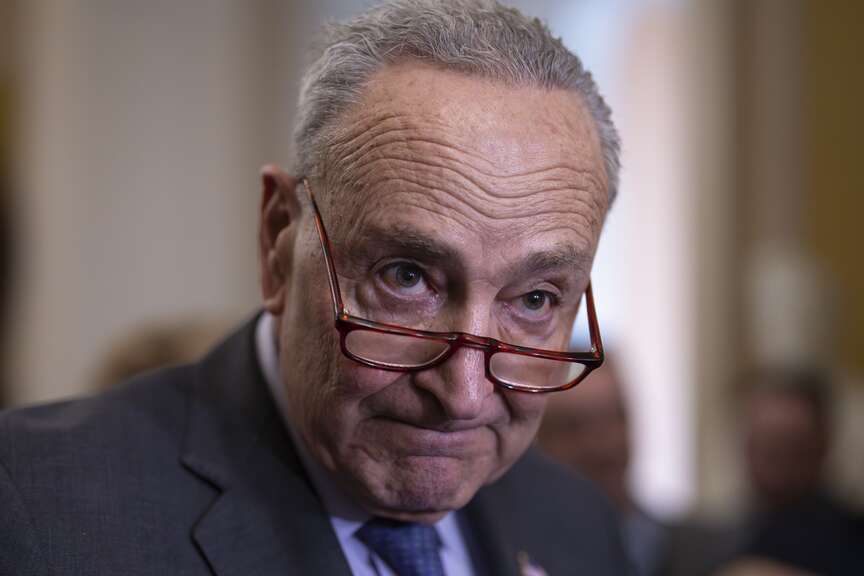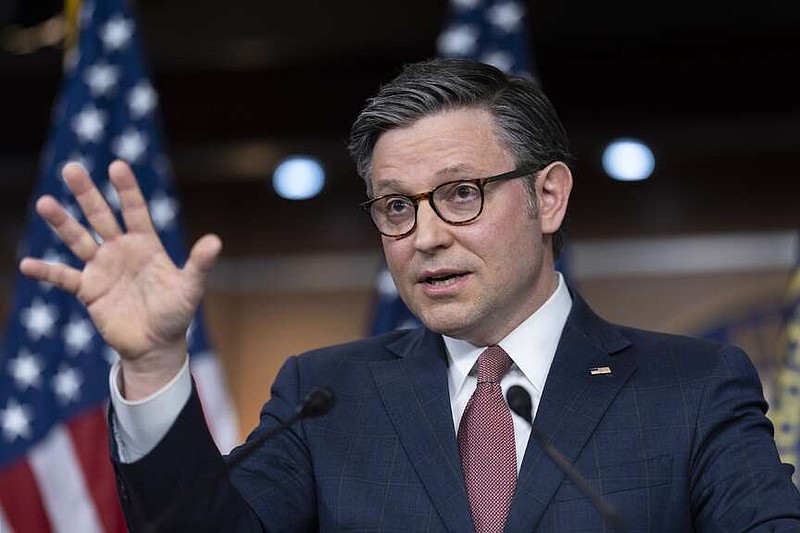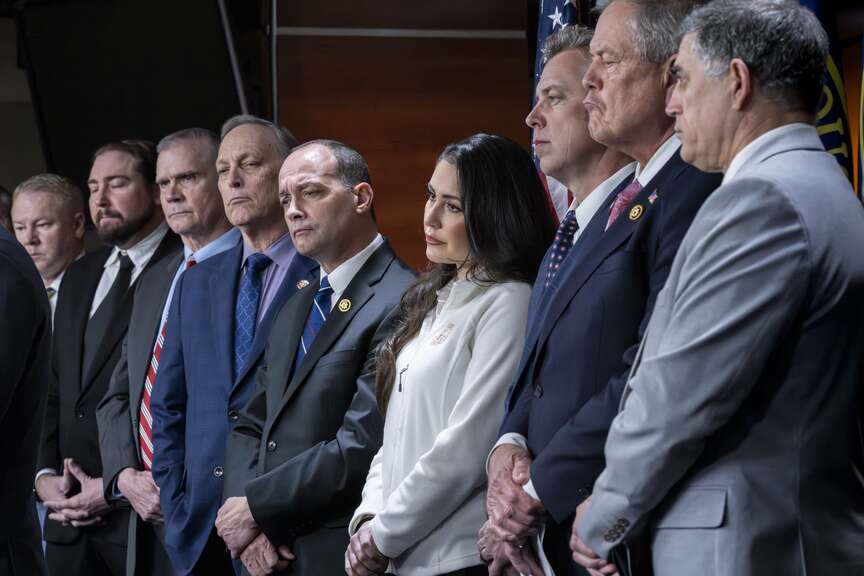WASHINGTON -- The Senate inched closer to passage of a $1.2 trillion package of spending bills late Friday after reaching agreement on a series of proposed amendment votes, though a final vote on passage was set to occur after a midnight funding deadline.
At press time, the Senate vote had not been completed.
Prospects for a short-term government shutdown had appeared to grow Friday evening after Republicans said Democrats had rejected their requests for votes on several amendments on border security and other issues. Any successful amendments to the bill would send the legislation back to the House, which has already left town for a two-week recess.
But shortly before midnight, Senate Majority Leader Charles Schumer announced a breakthrough.
"It's been a very long and difficult day, but we have just reached an agreement to complete the job of funding the government," Schumer said. "It is good for the country that we have reached this bipartisan deal. It wasn't easy, but tonight our persistence has been worth it."
While Congress has already approved money for Veterans Affairs, Interior, Agriculture and other agencies, the bill at issue Friday is much larger, providing funding for the Defense, Homeland Security and State departments and other aspects of general government.
The White House said it had a "high degree of confidence" the package would pass and President Joe Biden would sign it today.
The House had approved the package of spending bills earlier Friday, a long overdue action nearly six months into the budget year that would push any threats of a government shutdown to the fall.
The House passed the bill by a vote of 286-134, narrowly gaining the two-thirds majority needed for approval. More than 70% of the money would go to defense.
The vote in the House reflected anger among Republicans over the content of the package and the speed with which it was brought to a vote. House Speaker Mike Johnson, R-La., brought the measure to the floor even though a majority of Republicans ended up voting against it. He said afterward that the bill "represents the best achievable outcome in a divided government."
The vote breakdown showed 101 Republicans voting for the bill and 112 voting against it. Meanwhile, 185 Democrats voted for the bill and 22 against.
Rep. Kay Granger, the Republican chair of the House Appropriations Committee that helped draft the package, stepped down from that role after the vote. She said she would stay on the committee to provide advice and lead as a teacher for colleagues when needed.
Johnson broke up this fiscal year's spending bills into two parts as House Republicans revolted against what has become an annual practice of asking them to vote for one massive, complex bill called an omnibus with little time to review it or face a shutdown. Johnson viewed that as a breakthrough, saying the two-part process was "an important step in breaking the omnibus muscle memory."
Still, the package was clearly unpopular with most Republicans, who viewed it as containing too few of their policy priorities and as spending too much.
"The bottom line is that this is a complete and utter surrender," said Rep. Eric Burlison, R-Mo.
ARKANSAS DELEGATION
Three of Arkansas' House members -- Republican Reps. Rick Crawford of Jonesboro, French Hill of Little Rock and Steve Womack of Rogers -- supported the $1.2 trillion package. Rep. Bruce Westerman, R-Ark., joined a majority of House Republican Conference members in voting against the legislation.
Womack, a senior House appropriator who oversees the subcommittee handling financial services and general government operations, noted funding for the Defense Department as a factor in his decision. The package sets aside nearly $208 million for the Ebbing Air National Guard Base on top of $83 million approved for the Fort Smith site in this month's first spending package.
"I supported the package today because I refuse to turn my back on strengthening national security, improving border security, and additional funding for Fort Smith's critical pilot training program -- all while avoiding a painful government shutdown," Womack said.
Womack's subcommittee bill provides funding for the Treasury Department, as well as independent agencies such as the Internal Revenue Service. The congressman noted the bill rescinds $20.2 billion set aside for modernizing the IRS' workforce and technology system, which Republicans have argued would expand the agency's authority.
Westerman, of Hot Springs, argued the package did not do enough to address security concerns at the U.S.-Mexico border. The package does include funding for 22,000 Border Patrol agents, security technology and increases to detention bed capacity.
"The most significant issue facing our nation right now is the crisis at the southern border, and this package was railroaded by Chuck Schumer and Joe Biden to keep the border open and illegal immigration flowing," he said.
Westerman has shared his distaste for how Congress handled the current appropriations process after failing to approve the 12 spending bills before the current fiscal year started in October. He believed Congress should have passed a yearlong continuing resolution last fall so federal lawmakers could begin appropriations work for fiscal year 2025.
If Congress had approved a yearlong continuing resolution, it would have triggered a 1% spending cut.
"Congress has the power of the purse, and that grants us the ability to address out of control government spending and restore fiscal sanity in our nation, but federal bureaucracy is getting in the way of being able to do so," Westerman said.
Crawford agreed Congress should do more to address border security, but the package includes language he described as "critical and time sensitive."
"President Biden's progressive wave of liberal policies have been a disaster at the border and for our economy, all while more unvetted criminals pour into our communities," Crawford said. "We must focus our undivided attention on the additional changes required to secure the border."
House appropriators, including Womack and his subcommittee colleagues, began consideration of Biden's budget this week. Hill said Johnson and chamber leadership should use the momentum from passing the two packages to "move our appropriations process along so we can complete our work in a timely manner that reflects how our process is intended to be."
MONTHS IN THE MAKING
It has taken lawmakers six months into the current fiscal year to get near the finish line on government funding, the process slowed by conservatives who pushed for more policy mandates and steeper spending cuts than a Democratic-led Senate or White House would consider. The impasse required several short-term, stopgap spending bills to keep agencies funded.
The first package of full-year spending bills, which funded the departments of Veterans Affairs, Agriculture and the Interior, among others, cleared Congress two weeks ago with just hours to spare before funding expired for those agencies.
When combining the two packages, discretionary spending for the budget year will come to about $1.66 trillion. That does not include programs such as Social Security and Medicare, or financing the country's rising debt.
To win over support from Republicans, Johnson touted some of the spending increases secured for about 8,000 more detention beds for migrants awaiting their immigration proceedings or removal from the country. That's about a 24% increase from current levels. Also, GOP leadership highlighted more money to hire about 2,000 Border Patrol agents.
Democrats, meanwhile, are boasting of a $1 billion increase for Head Start programs and new child care centers for military families. They also played up a $120 million increase in funding for cancer research and a $100 million increase for Alzheimer's research.
"Make no mistake, we had to work under very difficult top-line numbers and fight off literally hundreds of extreme Republican poison pills from the House, not to mention some unthinkable cuts," said Sen. Patty Murray, the Democratic chair of the Senate Appropriations Committee. "But at the end of the day this is a bill that will keep our country and our families moving forward."
Sen. Susan Collins, the top Republican on that committee, appealed to her GOP colleagues by stating that the bill's spending on nondefense programs actually decreases even before accounting for inflation. She called the package "conservative" and "carefully drafted."
"These bills are not big spending bills that are wildly out of scope," Collins said.
White House press secretary Karine Jean-Pierre called on the Senate to pass the spending bill as quickly as possible.
"This bill is a compromise," she said. "No side got everything it wanted."
The spending in the bill largely tracks with an agreement that then-Speaker Kevin McCarthy worked out with the White House in May 2023, which restricted spending for two years and suspended the debt ceiling into January 2025 so the federal government could continue paying its bills.
Shalanda Young, director of the White House Office of Management and Budget, told lawmakers that last year's agreement, which became the Fiscal Responsibility Act, will save the federal government about $1 trillion over the coming decade.
Information for this article was contributed by Alex Thomas of the Arkansas Democrat-Gazette and by Kevin Freking, Mary Clare Jalonick, Lisa Mascaro, Farnoush Amiri and Chris Megerian of The Associated Press.
 FILE - Senate Majority Leader Chuck Schumer, D-N.Y., talks withreporters to discuss efforts to pass the final set of spending bills to avoid a partial government shutdown, at the Capitol in Washington, March 20, 2024. The race is on for Congress to pass the final spending package for the current budget year and push any threats of a government shutdown to the fall. With spending set to expire for several key federal agencies at midnight Friday, the House and Senate are expected to take up a $1.2 trillion measure that combines six annual spending bills into one package.(AP Photo/J. Scott Applewhite, File)
FILE - Senate Majority Leader Chuck Schumer, D-N.Y., talks withreporters to discuss efforts to pass the final set of spending bills to avoid a partial government shutdown, at the Capitol in Washington, March 20, 2024. The race is on for Congress to pass the final spending package for the current budget year and push any threats of a government shutdown to the fall. With spending set to expire for several key federal agencies at midnight Friday, the House and Senate are expected to take up a $1.2 trillion measure that combines six annual spending bills into one package.(AP Photo/J. Scott Applewhite, File)
